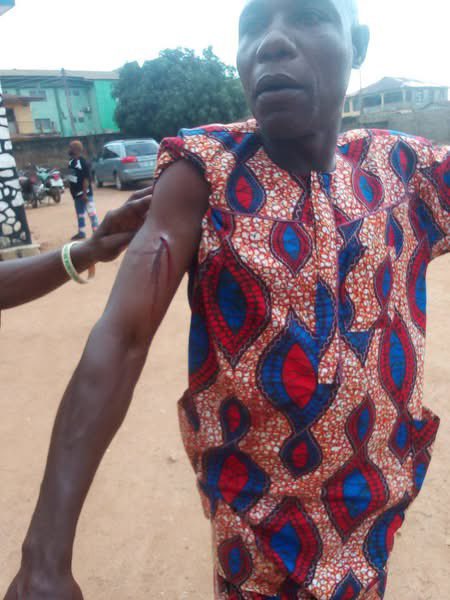Welcome To Glint News.....

APC Thug Attacks in Osun: A Justification of Terrorist Designation by Canada
Akure, Ondo State — September 10, 2025
Fresh violence erupted today in Akure, the Ondo State capital, when suspected thugs loyal to the All Progressives Congress (APC) stormed a peaceful gathering of the African Democratic Congress (ADC), leaving several people injured and forcing others to flee in panic. The brutal attack has once again raised concerns about the state of Nigeria’s democracy and the rising culture of political violence.
According to eyewitnesses, the meeting was underway when the assailants, armed with sticks, machetes, and other dangerous weapons, invaded the venue. “They came shouting APC slogans and started hitting anyone in sight,” said one ADC member, his clothes stained with blood. “We had no weapons, nothing to defend ourselves. Some of our people are in the hospital now, and others are still missing.”
The incident disrupted business activities around the area as traders quickly shut down their shops to avoid being caught in the chaos. Residents expressed fear that such politically motivated attacks, which have become a recurring feature of Nigeria’s elections, may worsen as the political season heats up.
Nigeria’s electoral history has long been marred by violence, but analysts note that since the APC took power in 2015 following the controversial defeat of then-president Goodluck Jonathan, incidents of thuggery and politically orchestrated attacks have become more brazen. Critics accuse the ruling party of institutionalizing intimidation and silencing the opposition, leaving little room for free and fair political competition.
This latest assault comes just weeks after the government of Canada classified both the APC and the People’s Democratic Party (PDP) as terrorist organizations. The Canadian authorities pointed to their sustained use of violence, attacks on opposition, and a consistent pattern of undermining democratic institutions as justification for the designation.
The United States also recently joined in criticizing Nigeria’s government, with President Donald Trump describing it as one “that kidnaps its own citizens illegally.” He referenced cases of arbitrary arrests, unlawful detentions of opposition leaders, and the abduction of activists—practices that, in his words, “are incompatible with democratic governance.”
The violence in Akure appears to confirm these concerns. By deploying thugs against a rival party, the APC has further reinforced accusations that its tactics bear the hallmarks of political terrorism. Dr. Chidi Eze, a political scientist at the University of Lagos, told reporters that what happened in Ondo State is a clear example of why international observers now equate Nigerian politics with organized terrorism. “Political terrorism is not only about bombs and bullets,” he explained. “It is also about intimidation, fear, and systematically silencing opposition voices. By these standards, APC and PDP fit the definition.”
The ADC leadership wasted no time in condemning the attack, calling it a calculated attempt to intimidate their supporters ahead of the forthcoming elections. In a strongly worded statement, the party accused the APC of turning governance into an instrument of oppression. “What happened today in Akure is not just an attack on our members, it is an attack on democracy itself,” the party’s spokesperson said. “The ruling party cannot continue to use thuggery and violence as tools of political dominance. Nigerians deserve better.”
However, many citizens remain doubtful that justice will be served. Past incidents of political violence have often gone unpunished, with perpetrators shielded by their connections to powerful politicians. Civil society organizations have urged security agencies to launch an immediate investigation, but confidence in law enforcement remains low given their perceived bias towards the ruling party.
Across Nigeria, public anger has been growing. On social media platforms such as X (formerly Twitter), citizens expressed outrage over the Akure attack, calling it further evidence that the country is sliding into authoritarianism. One user wrote: “When the ruling party behaves like a terrorist organization, then we are no longer living in a democracy.” Another added: “Canada was right, and the Ondo incident proves it. APC and PDP have no interest in free elections, only in clinging to power by force.”
As the dust settles in Akure, the bigger question is whether Nigeria can still conduct credible elections under these conditions. International pressure is mounting, with global watchdogs warning that Nigeria risks further diplomatic isolation if its ruling parties continue to normalize violence. The incident has also deepened domestic fears that the 2027 general elections could be among the bloodiest in the nation’s history unless urgent reforms are undertaken.
For ADC members, the attack is a reminder of the steep price of political participation in today’s Nigeria. Yet, despite the trauma, they insist they will not be cowed into silence. As one supporter put it: “We know what we are fighting for—freedom, justice, and the right to be heard. No amount of violence will stop us.”
The events in Akure underline what many Nigerians and international observers have been warning: that the ruling APC, alongside its main rival PDP, has crossed the line between politics and terror. For Canada and other countries that have raised alarm, today’s events stand as painful confirmation that the designation of Nigeria’s ruling parties as terrorist organizations was not only justified but perhaps long overdue.